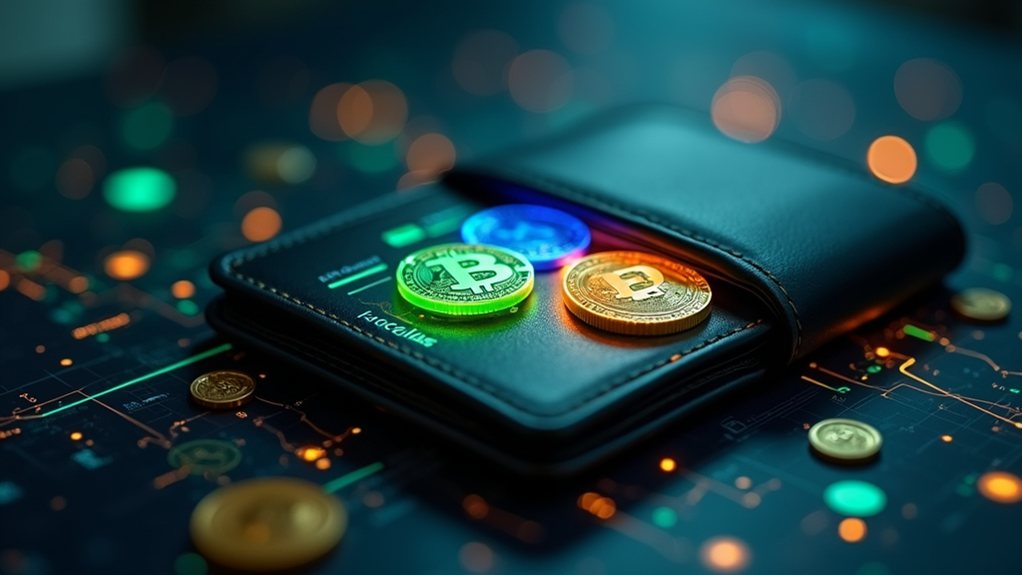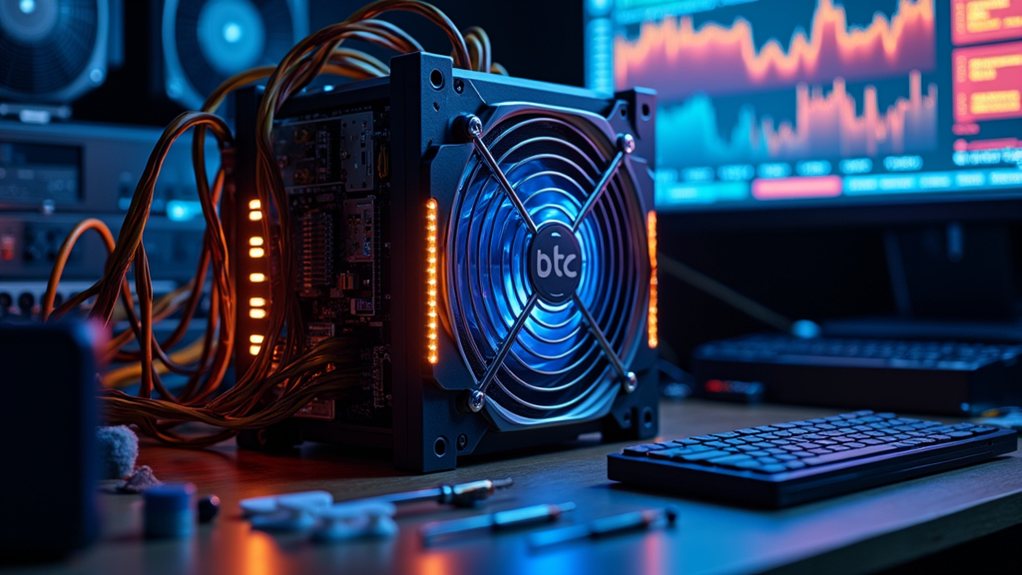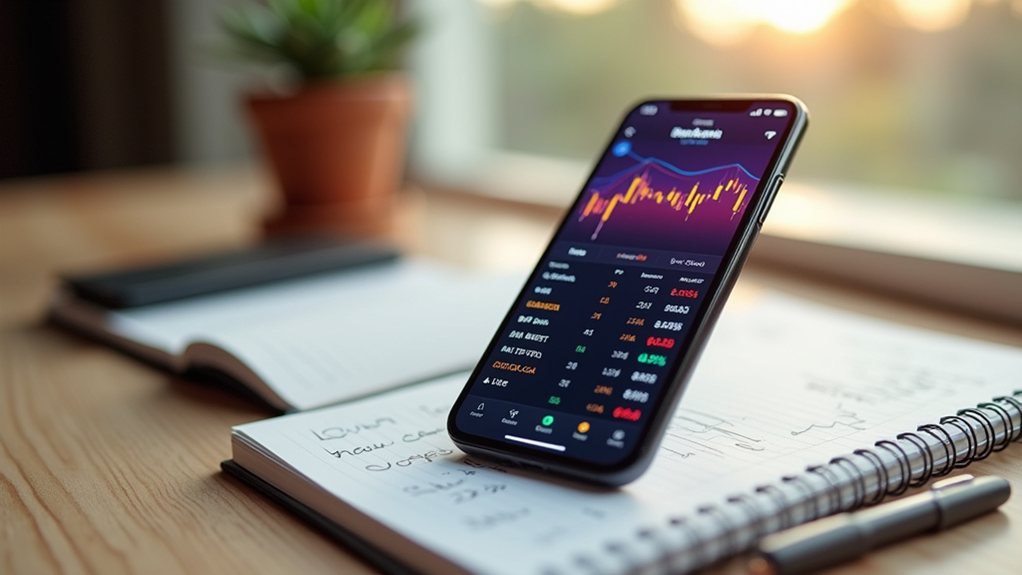Getting crypto airdrops takes just five steps. First, create a compatible wallet like MetaMask or Trust Wallet. Next, scout social media platforms and aggregator websites for legitimate opportunities. Third, meet eligibility requirements by holding specific tokens or completing tasks. Fourth, submit your wallet address where required. Finally, wait patiently for tokens to arrive. Using separate wallets for airdrops helps mitigate scam risks. The average airdrop hunter earns nearly $9,400 annually—not bad for free digital flyers.

Thousands of crypto enthusiasts wake up every morning hoping to hit the digital jackpot—not through trading, but through airdrops. These free token distributions have turned ordinary wallet holders into overnight winners. Some lucky participants in the Uniswap airdrop scored $1,200 in 2020. Others bagged a whopping $17,000 from the Ethereum Name Service airdrop in 2021. Not bad for clicking a few buttons.
Getting started with airdrops isn't rocket science. First, crypto projects simply give away tokens to wallet addresses as a marketing strategy. It's like digital flyers, except these flyers might be worth something someday. Or nothing. Crypto's wild like that.
Finding legitimate airdrops requires some legwork. Social media is crawling with airdrop announcements—Twitter, Telegram, Discord. These platforms buzz with news about upcoming distributions. Airdrop aggregator websites gather this information in one place. Less hunting, more claiming. Blockchain explorers show new token contracts being deployed. Early birds catch the crypto worms.
A compatible cryptocurrency wallet is non-negotiable for participation. Most airdrops favor MetaMask, Trust Wallet, or other popular options. Projects typically set eligibility criteria—holding specific tokens, participating in testnets, or completing simple tasks. Tweet about the project. Join their Discord. Refer friends. Submit your wallet address. Wait.
The crypto world isn't all rainbows and free money. Scammers love airdrops. They're perfect bait. Fake airdrops litter the internet, phishing for private keys and seed phrases. Never share these. Ever. Smart participants use separate wallets for airdrops to quarantine potential risks. Research is essential—anonymous team? Brand new website? Asking for money upfront? Run.
Many don't realize airdrops come with tax obligations. In numerous jurisdictions, free tokens count as taxable income. The value at receipt matters for tax purposes. Sell those tokens later? That's potential capital gains tax. Record-keeping becomes vital. Nobody loves surprise tax bills.
Projects distribute airdrops for strategic reasons. They need visibility. They want adoption. Building a community overnight works. Early supporters get rewards. Token ownership spreads across thousands of wallets. Instant decentralization. Instant liquidity. Everybody wins. In theory.
The biggest airdrop successes have become legendary. Beyond Uniswap and ENS, 1inch exchange dropped $2,000 per eligible user. Optimism distributed $250 million in tokens. dYdX trading platform rewarded active users with up to $50,000 in tokens. Average airdrop hunters earn approximately $9,384 in rewards annually, making the effort worthwhile for many participants. These numbers explain the airdrop hunting frenzy. Many successful distributions follow the holder airdrop model, requiring participants to own a minimum quantity of specific coins to qualify for new tokens.
The game continues daily. New projects, new tokens, new opportunities. The crypto ecosystem grows through these digital giveaways. Just remember—nothing is truly free. Except sometimes, it actually is.
Frequently Asked Questions
Are Airdrops Taxable in My Country?
Airdrops are taxable in most countries.
The US, UK, and Australia all tax them as income at fair market value upon receipt.
Germany's a bit fuzzy—might be tax-free in some cases.
Each country has different reporting requirements.
The tax man always wants his cut.
Doesn't matter how "free" these tokens seem.
Keep records.
Different rules apply when you eventually sell those airdropped tokens too.
How Can I Verify if an Airdrop Is Legitimate?
Verifying legitimate airdrops isn't magic. Check official sources first—website, social media, reputable crypto news sites.
Research team credentials and GitHub activity. Red flags? Requests for private keys, excessive personal info, or upfront fees. Those are scam central, obviously.
Community feedback matters too. Forums like Bitcointalk or Reddit can reveal the truth pretty quick. Some projects are just wolves in sheep's clothing.
Trust, but verify. Always.
What Security Risks Should I Watch for When Claiming Airdrops?
Security risks lurk everywhere in the crypto airdrop space.
Phishing scams try stealing private keys through fake websites. Smart contract vulnerabilities can drain wallets instantly. No joke.
Privacy concerns abound when handing over personal data for KYC. Some airdrops install malware. Others track wallet activity through "dusting."
Regulatory issues exist too – securities violations, tax implications. The crypto world's a minefield. Proceed at your own risk.
Can Hardware Wallets Receive Airdrops?
Yes, hardware wallets can receive airdrops. These secure devices handle ERC-20 and other token standards with ease.
Ledger, Trezor, SafePal—they've got you covered. Simply generate a public address, register it on the airdrop platform, and wait.
The beauty? Your private keys stay offline. Sure, there's a learning curve, and some airdrops might need web connections, but for high-value tokens, the extra security is worth the hassle.
How Much Crypto Investment Is Needed to Qualify for Airdrops?
Investment requirements for airdrops vary wildly. Some cost nothing—zero, zip, nada.
Others demand specific token holdings. You'll find $100-500 worth of crypto is typically enough for many projects.
The bigger the project, the higher the threshold. Factors like target audience and distribution models matter too.
Whales get different treatment than everyday holders. That's just how the crypto game works.








